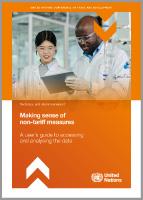
Non-tariff measures (NTMs) are policies and regulations that affect international trade by increasing compliance costs, making it more expensive for businesses – especially small and medium-sized enterprises (SMEs) – to meet foreign market requirements.
These measures include food and safety regulations – such as sanitary and phytosanitary (SPS) standards – technical barriers to trade and import or export restrictions. While essential for public policy goals like protecting people’s health and the environment, NTMs can also create significant obstacles to trade.
This guide explains how to access and understand data on non-tariff NTMs using the UNCTAD Trade Analysis and Information System (TRAINS) NTM database. Covering 145 countries and economies, this comprehensive tool promotes transparency and helps users navigate complex trade regulations. It provides valuable insights for policymakers, businesses and researchers working to lower trade costs and improve access to global markets.
Key Points
- NTMs outweigh tariffs in trade costs. NTMs are estimated to impose trade costs that are three to four times higher than tariffs. For example, technical regulations like SPS measures can ensure food safety but also create hurdles for exporters due to high compliance costs.
- A tool for better policies. Policymakers can use the database to review and streamline their regulatory frameworks. For instance, governments can use it to analyze the costs and effectiveness of NTMs, supporting better regulatory practices and fostering sustainable economic development.
- A guide to help businesses navigate compliance. The TRAINS database helps exporters understand regulations in foreign markets. For example, businesses can use it to determine the certification, labeling or safety requirements they must meet in a target market.
- Data and insight for researchers. Researchers can download the datasets and tools for further analysis. Metrics like frequency indices and ad-valorem equivalents allow them to calculate NTMs' trade impact in tariff-equivalent percentages, enabling robust economic assessments.
- Transparency as a public good. By consolidating trade regulations, the database reduces information gaps, especially for SMEs in developing countries. Access to this data enables them to better understand and comply with trade requirements, unlocking new market opportunities.


